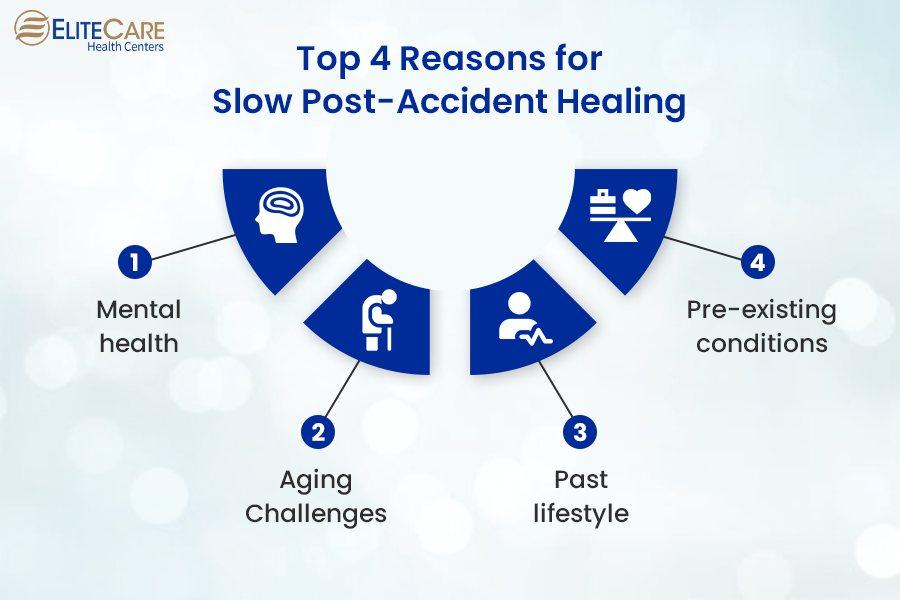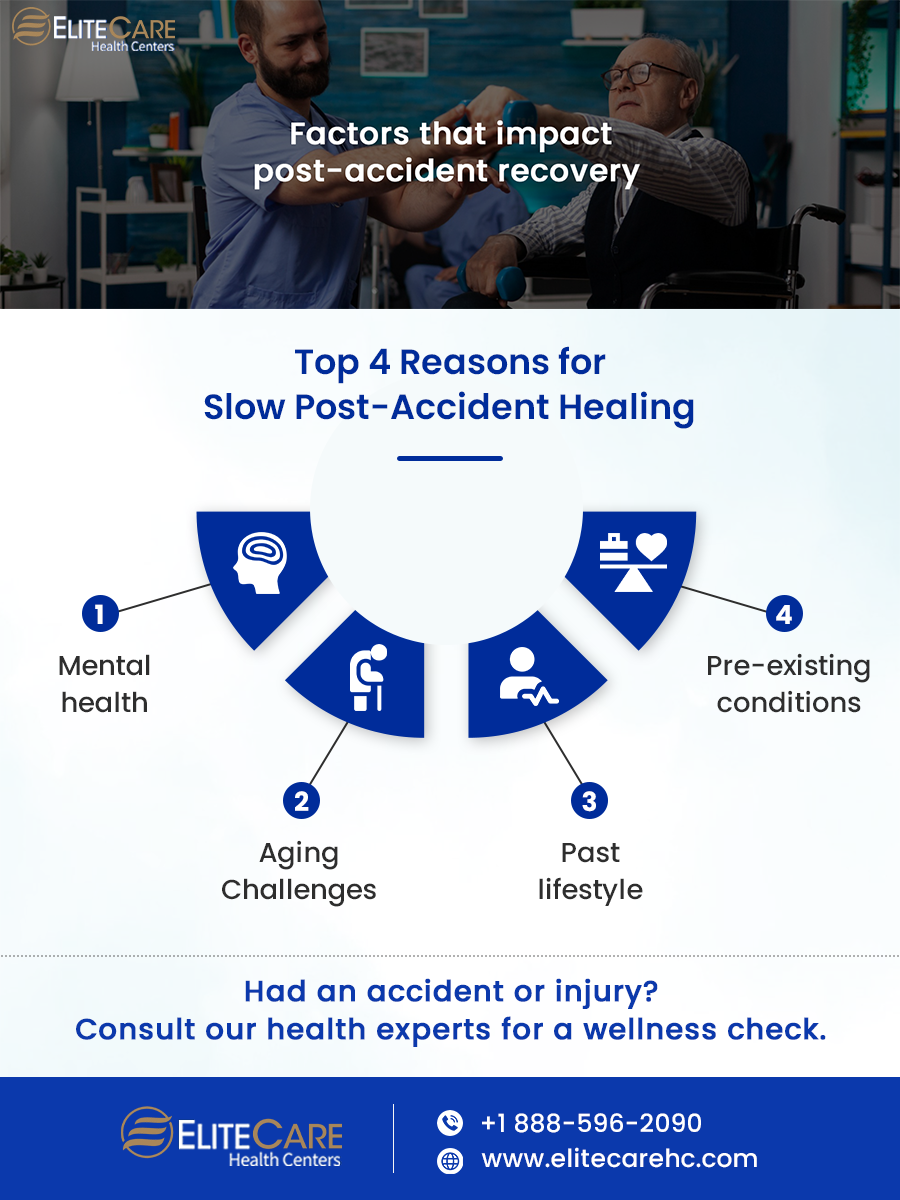
A sudden accident might simply be the last thing a person is expecting on a normal day. However, understanding what happens after an accident is critical in post-accident recovery. Accident survivors are often left with unpleasant symptoms and issues for longer durations (months or years) and the recovery period depends on the person’s past lifestyle and certain external factors.
Discover which factors can delay speedy recovery and how to navigate through this period of trauma.
Top 4 Reasons for Slow Post Accident Healing

Mental Health Matters
Research demonstrates that a person’s mental health might influence their recovery—for better or worse. Depression and anxiety are mental health disorders that can make pain worse and delay healing. It is also possible for pain and mental health issues to complicate one another, i.e., anxiety and despair are worsened by pain-related symptoms, and vice versa.
Accident victims are likely to experience a wide range of feelings, and they could be wary of situations that remind them of the incident that caused their injury. They might develop depression and could feel resentful of their dependence on others. Mental health is as important as healing a broken limb or any other physical injury.
Aging can hinder natural healing process
Although scientists are not completely sure why aging impacts the healing process, it certainly slows down the healing process. It’s possible that the body cells lose some of their capacity to fight off infection. It may also impact the body’s inflammatory reactions, which aid in halting bleeding and promote the creation of new tissue. Additionally, studies indicate that as people age, their collagen, which promotes healing and the formation of scar tissue, changes.
Read more: The Importance of Health and Wellness
Additionally, with age, there is a higher chance of preexisting diseases that affect the capacity for recovery and tolerance for particular treatments. For instance, COPD (chronic obstructive pulmonary disease) and heart disease can prevent the person from undergoing surgery or limit their capacity to engage in extensive physical therapy. According to research, self-care and planning might aid in the recovery. Accident survivors can also look for tools in their neighborhood and social networks that will support in the recovery.
Impact of preexisting conditions
In order to heal from an injury, the body requires oxygen, nutrition, and specialized cells. The body has a tougher time getting these necessities to the injured body part when certain pre-existing conditions (diabetes, COPD, etc.) lowers blood flow.
It is critical to let the doctor know about any pre-existing conditions as they can alter the course of therapy to better suit the patient’s unique requirements and keep a closer eye on the recovery process.
Lifestyle
Tobacco Use
According to research, smoking hinders the body’s natural healing processes. Healing issues are more common in smokers than in non-smokers. Numerous compounds, such as nicotine, carbon monoxide, and hydrogen cyanide, are found in tobacco. These substances affect your healing in a number of ways, including:
- Lowering of the blood’s oxygen content
- Thickened blood, making it harder for it to reach the injury site
- Weak bodily defenses
- Inflammation
These problems can delay the recovery of soft tissues and potentially lead to non-unions, in which the bones do not mend or take a long time to mend, following a fracture or surgery. We are all aware of how challenging it is to stop using tobacco. However, doctors can assist in creating a cigarette reduction strategy that will enable the patient to overcome their dependence on nicotine.
Read More: 7 Habits for Healthy Living
Alcohol use
Drinking after accident injuries may delay the recovery process. Alcohol causes edema and inflammation to increase, which might lengthen the healing process. This is because drinking thins the blood, which causes it to flow more quickly and collect near wounds.
Read More: 6 Tips to Help Seniors Maintain a Healthy Lifestyle
Alcohol may also lessen one’s ability to experience physical discomfort. Therefore, the person may exercise less caution than someone who can sense every movement. Under the influence of alcohol, the person also runs the risk of stumbling or falling. This can exacerbate an existing injury or result in new harm.
Diet
It is common to choose tasty foods over nutritious foods. But these satiating foods that will fuel your body are often rich in sugar and salt and can cause inflammation which makes it challenging for the body to heal rapidly. Foods heavy in trans-fat, dairy, and processed meats can all contribute to inflammation.
Try to include Inflammation-reducing foods like blueberries, salmon, almonds, and spinach in the diet. Be mindful of fat consumption and drink enough water.
Conclusion
One key aspect to keep in mind after an accident is to continue the treatment until the doctor releases the patient from the course of therapy. Communicate openly about any side-effects or disturbances. Refrain from self-medication as in the present world it is easier to search Google for the “best primary care doctor near me” and consult with them if any doubt or complication arises.





